
Michael Laurence Nyman, CBE is an English composer, pianist, librettist, musicologist, and filmmaker. He is known for numerous film scores, and his multi-platinum soundtrack album to Jane Campion's The Piano. He has written a number of operas, including The Man Who Mistook His Wife for a Hat; Letters, Riddles and Writs; Noises, Sounds & Sweet Airs; Facing Goya; Man and Boy: Dada; Love Counts; and Sparkie: Cage and Beyond. He has written six concerti, five string quartets, and many other chamber works, many for his Michael Nyman Band. He is also a performing pianist. Nyman prefers to write opera over other forms of music.

A Zed & Two Noughts is a 1985 film written and directed by Peter Greenaway. This film was Greenaway's first collaboration with cinematographer Sacha Vierny, who went on to shoot virtually all of Greenaway's work in the 1980s and 1990s, until Vierny's death. Greenaway referred to Vierny as his "most important collaborator". The film deals with twin zoologists who, after losing both their wives in a car accident, develop an obsession with animal decomposition.

Balanescu Quartet is an avant-garde string ensemble formed in 1987. Current members are Alexander Bălănescu (violin), Yuri Kalnits (violin), Úna Palliser (viola) and Nick Holland (cello).
The Man Who Mistook His Wife for a Hat is a one-act chamber opera by Michael Nyman to an English-language libretto by Christopher Rawlence, adapted from the case study of the same name by Oliver Sacks by Nyman, Rawlence, and Michael Morris. It was first performed at the Institute of Contemporary Arts, London, on 27 October 1986.
Facing Goya (2000) is an opera in four acts by Michael Nyman on a libretto by Victoria Hardie. It is an expansion of their one-act opera called Vital Statistics from 1987, dealing with such subjects as physiognomy, eugenics, and its practitioners, and also incorporates a musical motif from Nyman's art song, "The Kiss", inspired by a Paul Richards painting. Nyman also considers the work thematically tied to his other works, The Man Who Mistook His Wife for a Hat, The Ogre, and Gattaca, though he does not quote any of these musically, save a very brief passage of the latter. It was premièred at the Auditorio de Galicia, Santiago de Compostela, Spain on 3 August 2000. The revision with the cast heard on the album premiered at the Badisches Staatstheater Karlsruhe, Germany, on October 19, 2002. Vital Statistics has been withdrawn. The Santiago version included more material from Vital Statistics. The opera was most recently performed at the 2014 Spoleto Festival USA, located in Charleston, South Carolina.
The Michael Nyman Band, formerly known as the Campiello Band, is a group formed as a street band for a 1976 production of Carlo Goldoni's 1756 play, Il Campiello directed by Bill Bryden at the Old Vic. The band did not wish to break up after the production ended, so its director, Michael Nyman, began composing music for the group to perform, beginning with "In Re Don Giovanni", written in 1977. Originally made up of old instruments such as rebecs, sackbuts and shawms alongside more modern instruments like the banjo and saxophone to produce as loud a sound as possible without amplification, it later switched to a fully amplified line-up of string quartet, double bass, clarinet, three saxophones, horn, trumpet, bass trombone, bass guitar, and piano. This lineup has been variously altered and augmented for some works.

Michael Nyman is the third album release by Michael Nyman and the second with the Michael Nyman Band, having previously contributed tracks to new music compilations. Most of the music was material from early films by Peter Greenaway such as "Bird List Song" from The Falls, sung by Lucie Skeaping, and music from Act of God and Tree.

The Michael Nyman Songbook is a collection of art songs by Michael Nyman based on texts by Paul Celan, Wolfgang Amadeus Mozart, William Shakespeare and Arthur Rimbaud. It was recorded as an album with Ute Lemper in 1991, and again as a concert film in 1992, under the direction of Volker Schlöndorff, again with Ute Lemper, though many of the musicians had changed. The songs have been recorded by others and as instrumentals, and are published by Chester Music. The album has been issued by both London Records and Argo Records, though the covers are the same except for the logo.
Man and Boy: Dada is a 2003 opera by Michael Nyman with a libretto by Michael Hastings. It tells the story of a friendship between aging dada artist Kurt Schwitters and a twelve-year-old boy. These two characters and the boy's mother make up the cast of the opera.
Love Counts is a 2005 opera in two acts by Michael Nyman to a libretto by Michael Hastings.

The Essential Michael Nyman Band is a studio album featuring a collection of music by Michael Nyman written for the films of Peter Greenaway and newly performed by the Michael Nyman Band. It is the seventeenth album release by Nyman. The album features liner notes by Annette Morreau, who describes the album as "a summation and digest of ten years of progress in the performance of music by a composer -- a composer with whom, so evidently, a group of friends and expert musicians intimately identify their total commitment, virtuosity, and joyous enthusiasm."

Michael Nyman for Yohji Yamamoto is volume 2 of Yohji Yamamoto's series of albums, The Show. The album features the solo violin work Yamamoto Perpetuo, which Nyman has since adapted into the String Quartet No. 4 and the orchestral work, Strong on Oaks, Strong on the Causes of Oaks. The violin is played by Alexander Balanescu, and Nyman can be heard on one track, "Song L," at the piano.
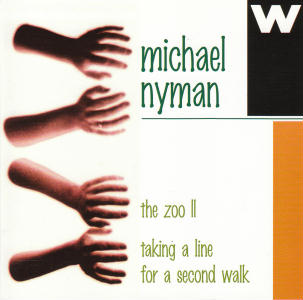
Taking a Line for a Second Walk is the name of piano duo reduction of a dance work for orchestra by Michael Nyman, Basic Black, written in 1986 for the Houston Ballet. It is eponymous with a 1994 album on Work Music on which it constitutes approximately half the material. The album is also known as Music for Two Pianos, which is given as the album's name on the back cover and insert back, while Taking a Line for a Second Walk appears on the front cover, spine, and physical disc. The performers are identified on the front cover, and all of the booklet, as The Zoo II, and on the back cover as "The Zoo Duet". As one of the tracks on the album is "Lady in the Red Hat" from A Zed & Two Noughts, also known as Zoo, this is often seen as a reference to that film. A photograph of the duo is inside the booklet, two young women in black on a black background, leaving only their wedding banded-hands and faces visible, with "The Zoo II" as the only caption. The pianists are identified as Helen Hodkinson and Brenda Russell in the Michael Nyman discography on the 1995 promotional compilation Michael Nyman.
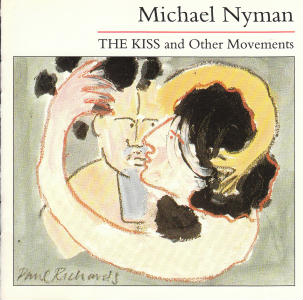
The Kiss and Other Movements is the sixth album release by Michael Nyman, and the fifth recording with the Michael Nyman Band. The title track is an "operatic duet" between Dagmar Krause and Omar Ebrahim, based on a painting of the same title by Paul Richards, which is depicted on the cover, and used in a video art project by Richards of the same name. The album includes music from Peter Greenaway's Making a Splash and 26 Bathrooms, an excerpt of Nyman's unfinished opera, Tristram Shandy, and a concert piece, "Tango Between the Lines".
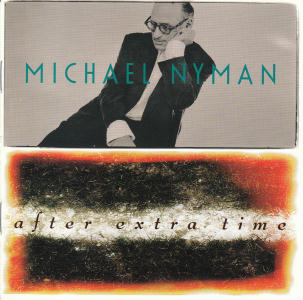
After Extra Time is a 1996 album by Michael Nyman with the Michael Nyman Band containing three tributes to Nyman's fandom of Association football: After Extra Time, the soundtrack to The Final Score, and Memorial. The latter is described as a remix, but is simply the 1992 recording from The Essential Michael Nyman Band. It was included in order to put it together with his two other football-inspired works. The album lists only three tracks, which has caused it to be erroneously reported that Memorial is track 3 and the others are all hidden tracks, but Memorial is track 26. Therefore, a track listing, as the individual portions of the pieces are not named, is not useful. The three pieces were recorded at separate times and thus have separate personnel lists.
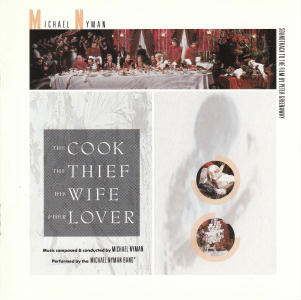
The Cook The Thief His Wife & Her Lover is the twelfth album release by Michael Nyman and the ninth to feature the Michael Nyman Band. It is the soundtrack to the eponymous film by Peter Greenaway. The album includes the first commercially released recording of Memorial, and this is the only piece discussed in the liner notes, to the point that the lyric sheet for "Miserere", the song which Pup the kitchen boy sings, is misidentified "Memorial." "Book Depository" is one of Nyman's many waltzes.
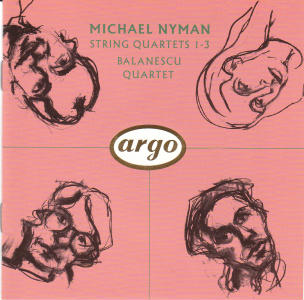
String Quartets 1–3 is a 1991 album by the Balanescu Quartet and the fifteenth release by Michael Nyman. It is the second album of his music on which he did not perform or conduct, though he does provide liner notes. String Quartet No. 3 is built out of Out of the Ruins and became a fixture in numerous Nyman film scores in the 1990s.

Six Celan Songs • The Ballad of Kastriot Rexhepi is the 54th album released by Michael Nyman, who composed and conducted both the works on the album. The first, a setting of poetry by Paul Celan, was originally recorded by Ute Lemper and the Michael Nyman Band on The Michael Nyman Songbook in 1991, and here the band is joined by Hilary Summers. The Ballad of Kastriot Rexhepi is a new work created with the artist Mary Kelly. This is performed by the soprano Sarah Leonard with The Nyman Quartet: Gabrielle Lester, Catherine Thompson, Kate Musker and Tony Hinnigan.

Alexander Bălănescu is a Romanian violinist, and founder of the Balanescu Quartet.

The Composer's Cut Series Vol. II: Nyman/Greenaway Revisited is the second in a series of albums, all released on the same day, by Michael Nyman to feature concert versions of film scores, in this case, films of Peter Greenaway, and his 52nd release overall. The album is similar to The Essential Michael Nyman Band, although a number of tracks are on only one album or the other. In spite of being recorded in 1992, with the same lineup, Memorial is not the same performance as the one that appears on The Essential Michael Nyman Band or After Extra Time, which was recorded in Tokyo. This performance was recorded in London and is slightly less aggressively performed.















